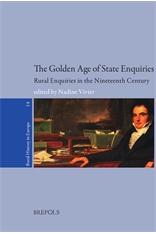Publications | Dernières parutions
The Golden Age of State Enquiries. Rural Enquiries in the Nineteenth Century. From Fact Gathering to Political Instrument
The heart of the nineteenth century was the golden age of state enquiries in Europe. This international comparative study highlights the importance of transnational cultural tranfers and the enquiries as a means of construction of the nation state.Any state intervention in society requires a high degree of knowledge. This is usually given by a state-sponsored enquiry. Some of these surveys can be traced back to Antiquity, but by the nineteenth century enquiries proved to be different because the nature of the state and the distribution of political influence had changed, and the scientific and financial means to investigate had progressed. This new context prompted states to launch large enquiries to assess transformations in the rural world: new techniques, opening to long distance trade. The heart of the nineteenth century was the golden age of state enquiries. Inspired by the nascent sociology, they fulfilled the desire for scientific knowledge accessible to everyone and the search for innovative solutions for the improvement of agriculture and rural life.Most of those enquiries about the countryside are well known by historians who have built their work on the vast data collections. In a different approach, the present volume does not focus on their content; it examines the origins and functioning of the enquiries as new and important objects of historical research. Fourteen studies are gathered from across twelve countries. The main focus is on Western Europe, with broadening perspectives to the East (Ottoman Empire) and West (Canada and Mexico). The International comparative perspectives highlight the importance of transnational cultural transfers in the nineteenth-century Atlantic world. French and British methods were considered models of progress and of a civilized state. Statistical methods and the needs of the administration were discussed and adapted in each state according to their conception of state power, in the context of the construction of the nation state.
Nadine Vivier is Professor of social and economic history at the University of Maine (Le Mans, France). Her research interests focus on rural societies from 1750 to 2000 in France and in Europe.
 Actualités
Actualités
Les intermédiaires dans la relation de travail dans les sociétés esclavagistes et post-esclavagistes, XVe siècle à nos jours
 Appel à communication - Samedi 1 mars 2025 - 18:00ArgumentaireDans la vaste question du travail contraint et forcé, les intermédiaires, placés à l’intersection des statuts de libre, d’esclave ou d’engagé, jouent un rôle central, quoique relativement négligé par l’historiographie. Ce numéro 'Esclavages & post~esclavages / Slaveries & Post~Slaveries (n°13, 2026, CIRESC), dirigé par Alessandro Stanziani (GRHEN), propose d’exposer leurs situations dans le long terme, du moment de la traite à cel(...)
Appel à communication - Samedi 1 mars 2025 - 18:00ArgumentaireDans la vaste question du travail contraint et forcé, les intermédiaires, placés à l’intersection des statuts de libre, d’esclave ou d’engagé, jouent un rôle central, quoique relativement négligé par l’historiographie. Ce numéro 'Esclavages & post~esclavages / Slaveries & Post~Slaveries (n°13, 2026, CIRESC), dirigé par Alessandro Stanziani (GRHEN), propose d’exposer leurs situations dans le long terme, du moment de la traite à cel(...)
Hugo Souza de Cursi, lauréat de la bourse d'aide à publication de l'IDA 2024
Prix et distinctions -L’ appel à publication de thèses lancé par l’Institut des Amériques (IDA) a vocation, chaque année, à attribuer une aide financière à de jeunes docteurs en sciences humaines et sociales dans le cadre de projets de publication de leur thèse. Les thèses récompensées abordent des thématiques en lien avec les Amériques.Parmi les trois projets retenus dans le cadre de l’appel lancé par l’IDA pour l’année 2024, et soumis à l’acceptation définitive des Presses universitaires d(...)
Prix de la pensée européenne 2024
Prix et distinctions -Le premier prix de la pensée européenne, créé par des intellectuels engagés, a été remis le 16 mars 2024 à Conques, dans l’Aveyron. L’objectif est de promouvoir un idéal démocratique européen qui réponde aux enjeux environnementaux et sociaux du monde.Associé à un colloque de fond "Le réveil de la pensée européenne ?" qui sest déroulé les 16 et 17 mars au Centre européen de Conques (retransmis en direct avec Philosophie Magazine), et présidé par le philosophe Dominique(...)
ERHIMOR
EHESS-CRH
54 boulevard Raspail
75006 Paris
Tél. : +33 (0)1 49 54 24 42
ou : +33 (0)1 49 54 25 74
Fax : +33(0)1 49 54 23 99
Dernière modification :
18/04/2018



